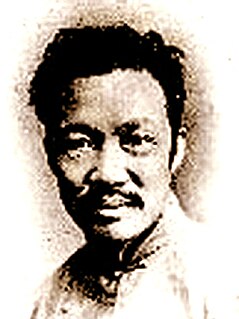
Academia Sinica, headquartered in Nangang District, Taipei, is the national academy of the Republic of China (Taiwan). It supports research activities in a wide variety of disciplines, ranging from mathematical and physical sciences, to life sciences, and to humanities and social sciences. As an educational institute, it provides PhD training and scholarship through its English-language Taiwan International Graduate Program in biology, agriculture, chemistry, physics, informatics, and earth and environmental sciences. Academia Sinica is ranked 144th in Nature Publishing Index - 2014 Global Top 200 and 22nd in Reuters World's Most Innovative Research Institutions. The current president since 2016 is James C. Liao, an expert in metabolic engineering, systems biology and synthetic biology.

The French School of the Far East, abbreviated EFEO, is an associated college of PSL University dedicated to the study of Asian societies. It was founded in 1900 with headquarters in Hanoi in what was then French Indochina. After the independence of Vietnam, its headquarters were transferred to Paris. Its main fields of research are archaeology, philology and the study of modern Asian societies. Since 1907, the EFEO has been in charge of conservation work at the archeological site of Angkor.
James Henry Breasted was an American archaeologist, Egyptologist, and historian. After completing his PhD at the University of Berlin in 1894, he joined the faculty of the University of Chicago. In 1901 he became director of the Haskell Oriental Museum at the university, where he continued to concentrate on Egypt. In 1905 Breasted was promoted to full professor, and held the first chair in Egyptology and Oriental History in the United States.
Hebei Normal University is a university in Shijiazhuang, Hebei province, China. It is a provincial key university with more than 100 years history, and is supported by both Hebei Province and Education Department of China.

Northeast Normal University is one of the six national normal universities in the People's Republic of China, located in Changchun, Jilin province. The university was ranked number 37 in the comprehensive ranking of universities in China in 2013, and listed as a project 211 university. It is a Chinese Ministry of Education Double First Class Discipline University, with Double First Class status in certain disciplines.

The UCL Institute of Archaeology is an academic department of the Social & Historical Sciences Faculty of University College London (UCL), England which it joined in 1986. It is currently one of the largest centres for the study of archaeology, cultural heritage and museum studies in the world, with over 100 members of staff and 600 students housed in a 1950s building on the north side of Gordon Square in the Bloomsbury area of Central London.
Ahmad Hassan Dani FRAS, SI, HI, was an eminent Pakistani archaeologist, historian, and linguist. He was among the foremost authorities on Central Asian and South Asian archaeology and history. He introduced archaeology as a discipline in higher education in Pakistan and Bangladesh. Throughout his career, Dani held various academic positions and international fellowships, apart from conducting archaeological excavations and research. He is particularly known for archaeological work on pre-Indus Civilization and Gandhara sites in Northern Pakistan. He was also the recipient of various civil awards in Pakistan and abroad. As a prolific linguist, he was able to speak 35 local and international languages and dialects.

Guangxi Normal University is a provincial research university located in Guilin, Guangxi, China with historical strengths in teacher education, basic arts and sciences, and international exchange programs. Established in 1932 as one of the earliest normal schools in China, GXNU has evolved into a comprehensive university granting undergraduate, graduate, and doctoral degrees across 21 colleges and departments with 75 undergraduate majors.
Kwang-chih Chang, commonly known as K.C. Chang, was a Chinese/Taiwanese-American archaeologist and sinologist. He was the John E. Hudson Professor of archaeology at Harvard University, Vice-President of the Academia Sinica, and a curator at the Peabody Museum of Archaeology and Ethnology. He helped to bring modern, western methods of archaeology to the study of ancient Chinese history. He also introduced new discoveries in Chinese archaeology to western audiences by translating works from Chinese to English. He pioneered the study of Taiwanese archaeology, encouraged multi-disciplinal anthropological archaeological research, and urged archaeologists to conceive of East Asian prehistory as a pluralistic whole.
Kaogu is a peer-reviewed monthly academic journal of Chinese archaeology, published by the Institute of Archaeology of the Chinese Academy of Social Sciences.
Jac or JAC may refer to:

Awadh Kishore Narain was an Indian historian, numismatist and archaeologist, who has published and lectured extensively on the subjects related to South and Central Asia. He was well known for his book, The Indo Greeks, published by Oxford University Press in 1956, in which he discussed the thesis of British historian Sir William Woodthorpe Tarn.
Norman Hammond is a British archaeologist, academic and Mesoamericanist scholar, noted for his publications and research on the pre-Columbian Maya civilization.
Chelyabinsk State University is a university in Chelyabinsk, Russia. It was established in 1976 and is considered to be one of the leading academic institutions in the South Urals.
The Social Development Academy in Nanjing Normal University is an institute of the Nanjing Normal University on social development.
Mu-chou Poo is a Taiwanese Egyptologist and scholar in Comparative Antiquity. Poo was born in Taiwan and obtained his undergraduate degree from National Taiwan University (1975). After receiving his PhD from The Johns Hopkins University (1984), he became a Research Fellow at the Institute of History and Philology at Academia Sinica (1983-2009). Currently, Poo teaches at the Chinese University of Hong Kong as a Professor of History.

Xu Xusheng, also known by his courtesy name Xu Bingchang, was a Chinese archaeologist, historian, and explorer born in Tanghe, Henan Province. Best known for his discovery of the Erlitou culture in 1959, he was one of China's most important and respected archaeologists and historians of the twentieth century, providing a model of archaeological methodology for future Chinese archaeologists. He also was president of Beijing Normal University.
The Institute for Mediterranean Studies (IMS) is an interdisciplinary institute that promotes, facilitates and publishes research in the field of Mediterranean Studies. The IMS provides a center for holistic research and analysis of the Mediterranean Area, as well as academic teaching on the region. The IMS’s objectives are: fostering the establishment of Mediterranean Studies in the European and Middle-Eastern Research Areas, publishing scholarly literature on the Mediterranean, and establishing collaborative networks of researchers, academics and Mediterranean organizations across the world by organizing international conferences, seminars and ongoing global collaborations.
The Institute of Archaeology is a constituent institute of the Chinese Academy of Social Sciences (CASS), based in Beijing, China. It was founded on 1 August 1950, as part of the Chinese Academy of Sciences. Its original 20 or so researchers came from the Beiping Research Academy and the Institute of History and Philology, Academia Sinica of the Republic of China. In 1977, the institute became part of the newly established CASS.
Sheldon Lee Gosline is an American Egyptologist who has extensively studied the ancient civilizations of the Far East. He is noted for proposing the existence of a developing literate civilization in southern China dating to the second millennium BCE.